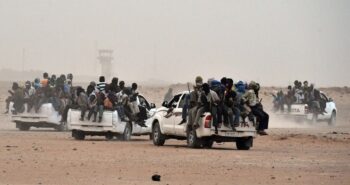
Libyans say climate change isn’t an excuse for the amount of neglect that happened with the maintenance of the dams.
When the heavy downpours started in Libya as Storm Daniel battered the country in September, people in Derna felt that the city’s two dams would protect them from devastating floods, and there was no concern to leave their homes.
But it wasn’t just rainfall. The devastating floods stemmed from the chain of mountains surrounding the northeastern coastal city and not from a tsunami in the Mediterranean.
The worst floods in the country’s history left more than 5,000 people dead and at least another 10,000 people are still missing. Entire neighbourhoods on the bank of the raging river were swept away. Climate change clearly played a key role in the collapse of the city’s two dams built in the 1970s to protect it from flooding.
The rainfall was unusually severe — the equivalent of a year’s rainfall in just 24 hours.
But there’s a consensus among many locals in the capital, Tripoli and elsewhere that years of negligence and political infighting are the main culprits and have greatly contributed to the severity of the unprecedented disaster.
Oil-rich Libya has been riven by political infighting, corruption and external interference since a 2011 uprising that toppled and later led to the death of the long-time ruler Muammar Gaddafi. Attempts stretching back a decade to form a unified functioning government have failed, and instead, two rival governments backed by their own military factions are based in Tripoli in the west and Tobruk in the east.
Now the two rival governments have tried to politically exploit the extreme weather event, says Moussa Tihosai, a Libyan analyst and researcher based in Tripoli.
“The political exploitation of the Derna crisis began from day one. But both sides then backed down because of embarrassment. Every government wants to undertake reconstruction and compete in rescue and relief operations to emerge as the saviour. In addition, the security services on both sides want to appear as a hero,” Mr Tihosai told Al Majalla.
One week after the torrential rain wiped off around a quarter of Derna, many locals took to the streets demanding the removal of those in power in the East and the West, accusing officials of political and financial corruption.
Venting their anger at all officials, they singled out the speaker of the eastern-based Libyan parliament, Aguila Saleh, as he framed the disaster in a religious context.
In the political and information war, the climate has been amplified and exploited by politicians, says Mr Tihosai.
____________________




